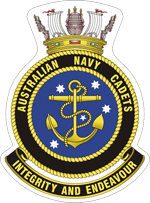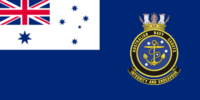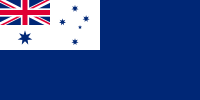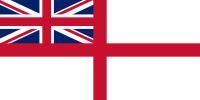Australian Naval Cadets
| Australian Navy Cadets | |
|---|---|

Australian Navy Cadet Crest
|
|
| Active | 1907 – present |
| Country |
|
| Allegiance | HM Queen Elizabeth II |
| Branch | Navy |
| Type | Volunteer Youth Organisation |
| Size | 92 Units, 2,200 Cadets |
| Part of | Australian Defence Force Cadets |
| Headquarters | Directorate ANC, Russell Offices, Canberra |
| Nickname(s) | ANC |
| Motto(s) | Integrity and Endeavour |
| March | Royal Australian Navy |
| Anniversaries | 1 July |
| Vessels Operated | Corsair, Envy, Various Powerboats, RHIB, Scruffy, Bosun's mate, Hobi Catamaran |
| Website | www |
| Commanders | |
| Director General ANC | Commodore Mark Hill, CSC, RAN |
| National Commander ANC | Captain Kerry Rayner, OAM, ANC |
| Director of Flotilla's | Captain Kerry Rayner, OAM, ANC |
| Chief of Staff | Commander Richard Trigg, ANC |
| Notable commanders |
RADM Sir David Martin, KCMG, AO CAPT Gavin Reeves |
| Insignia | |
| Australian Navy Cadets Ensign (2001–present) |  |
| Naval Reserve Cadets Ensign (1972–2001) |  |
| Australian Sea Cadet Corps Ensign (1956–1972) |  |
| Naval Ensign (1907–1956) |  |
The Australian Navy Cadets (ANC) is a voluntary youth organisation owned and sponsored by the Royal Australian Navy. Together with the Australian Air Force Cadets and Australian Army Cadets, it forms the Australian Defence Force Cadets. It hosts over 91 units.
The organisation was founded in the early 1900s and officially recognised under the Naval Defence Act in 1910. Prior to 1973, the organisation was known as the Australian Sea Cadet Corps, and was jointly administered by the Royal Australian Navy and the Navy League of Australia. After 1973, the Navy assumed full responsibility for the Corps, which was renamed the Naval Reserve Cadets. The Australian Government review, 'Cadets The Future' recommended a final name change to Australian Navy Cadets in 2000.
From 1942 until his death in 1952 HM King George VI was the Admiral of the Sea Cadet Corps.
The Following is a list of names held by both the Naval League and Defence run/sponsored programs including the original 'Church of England – Boys Naval Brigade' from 1901 to 1911:
ANC training is nautical in nature and includes waterborne activities. Activities can include, but are not limited to, navigation, communications, first aid, drill, maritime history, firearms proficiency and adventurous training. The ANC also aims to achieve the following with its training program:
There are 91 Training Ships (units) across Australia, with a total membership of over 400 staff and 2,200 cadets, including several that have been formed in High Schools. However, 2012 reporting suggested membership has fallen drastically to about 1,600. The ANC adheres to a rank structure similar to the Royal Australian Navy, with cadets having the opportunity to progress from the rank of Cadet Recruit to Cadet Midshipman. Each unit has a complement which lays out how many cadets the unit is allowed to carry and how many are allowed at each rank. Training camps and examinations are held for promotion in rank. The structure and organisation of the Australian Navy Cadets is based on that of the Royal Australian Navy however additionally features a large community involvement component.
...
Wikipedia
